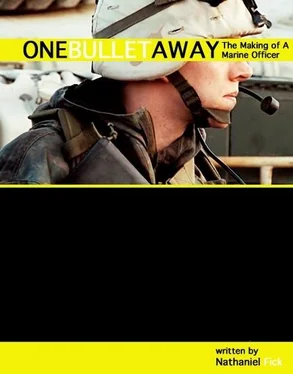“What do you think you’re doin’, boy? Crawl.”
“Aye-aye, Sergeant Instructor.” It came out garbled because mud stuck to the roof of my mouth like peanut butter. I continued pulling myself forward, past the candidate with the snake on his arm. The instructor who had kicked me was waiting as I climbed out of the Quigley.
“You can’t compromise a mission and get men killed for a harmless little snake. Not even for a poisonous big snake. Discipline always. Now get out of my sight.”
His message was clear: you need discipline most when it’s hardest to muster — when you’re tired, hungry, outside your comfort zone. I struggled for the next two days to stay alert, stay disciplined, and keep my focus on the candidates around me. We worked in squads of twelve, rotating as squad leader and attacking through acres of humid woods. Our tactics were unsophisticated: walk as quietly as possible to the objective and then charge it, wildly firing blanks from our M-16s. The mission of OCS was more to gauge spirit than to teach us skills.
It rained through both nights, and we slept in Korean War-era pup tents seemingly designed to collect water and channel it onto us. The rain and the gnawing hunger (we received only one meal per day) conspired to keep us awake. By the third afternoon, the dirt-encrusted faces of the candidates around me reflected the countless attacks and long runs with all our gear that we had endured. Just a few hours before the Crucible’s end, I was digging a hole to stay awake.
“What the hell are you doing, Candidate?” Olds’s voice suggested that whatever I was doing was not what I ought to be doing.
“Digging a foxhole, Sergeant Instructor Sergeant Olds.”
“Digging a what?”
“A foxhole.” I paused, trying to stand at parade rest while holding a shovel and pushing my helmet up so I could see him more clearly.
“Foxes dig holes to hide in. Marines dig fighting holes to kill the enemy from. Are you planning to hide in your hole or to use it as a weapon to kill the enemy?”
In the Marines, anything can be a weapon; it’s a whole new way of thinking. My plastic MRE (Meal, Ready-to-Eat) spoon was a weapon if I used it as an insulator on a radio antenna so that I could talk to jets and call in air strikes.
“Weapon, Sergeant Instructor.”
“Right. Now who’s providing security for you while you dig this weapon?”
I looked into the brush, searching for the other three candidates in my fire team. They were snoring.
“Candidate, Marines do everything in pairs. We fight in pairs. We patrol in pairs. We dig in pairs. Go to Thailand on deployment, and you’ll see that we even fuck in pairs. A Marine alone is easy to kill. A Marine with a buddy is hard as hell to kill. Don’t let me catch you alone again.”
Train your men as a team. I cursed myself for letting fatigue get to me.
Later in the morning, we packed our gear and hiked down to the parade deck. Hulking gray CH-53 Super Stallions, bigger than school buses, waited to ferry us over to TBS. It was my first helicopter ride. We sat on nylon benches along the sides of the cargo bay, and I looked past the tail ramp as the parade deck and our barracks fell away beneath us. Crossing I-95, I looked down at the cars filled with commuters. Clean people, well-fed, rested, in control of their days. I realized I wouldn’t trade places with any of them.
Candidates were grouped in fours as we gathered at the edge of the TBS landing zone. A second lieutenant met each group. These men had been on the Crucible not long before and knew to take us straight to the chow hall. We filled our plates with macaroni and pizza and ate slowly. No sergeant instructors lined the paths to our seats. No one threatened us for looking around the room or failing to keep our boot heels together. It felt rebellious. We went back for seconds.
Outside the chow hall, the platoon assembled in a formation. We were filthy but stood straight. Our rows and columns were perfectly aligned. Sergeant Olds made his way down each row, stopping before every candidate to shake his right hand and press a cold piece of metal into his left. I hoped Olds would say something encouraging to me, maybe note my improvement or say he had enjoyed having me in the class. Instead, he locked me with unblinking eyes and said, “You ain’t done yet.”
But we were done. I held the coveted Eagle, Globe, and Anchor. I snuck a look when Olds moved on to the next candidate in the formation. One inch across and anodized in black, it was a pin, eventually for wearing on a dress uniform. It was the symbol of the Marine Corps, immortalized on bumper stickers and baseball caps across America. With it in hand, I could go back to college for my senior year. When I returned to Quantico, it would be as a second lieutenant.
ON JUNE 12, 1999, in Dartmouth’s Baker Library, I raised my right hand to take the oath of office as a Marine Corps second lieutenant. “I do solemnly swear that I will support and defend the Constitution of the United States against all enemies, foreign and domestic.”
My mother pinned the gold bars on my epaulets, and my father presented me with the Mameluke sword. I knew from my summer at Quantico that the sword was a reminder of Lieutenant Presley O’Bannon’s expedition against the Barbary pirates in 1805. But I had no idea what it meant to be a Marine. Wearing my dress blues for the first time, I felt like an impostor in a Halloween costume.
After OCS graduation, I could have walked away from the Marines with no obligation. The Marine Corps liked the program because it attracted people who might not sign up for four years otherwise. Candidates liked it because we could return to school for a year and debate whether we wanted to go back to the Marines for a longer stay. For me, it was no decision at all. OCS had planted the hook. I hadn’t suffered through ten weeks at Quantico for nothing.
My classmates would soon be marching off to their graduate schools and consulting jobs, but our paths had not yet diverged. We still lived in the same world. Walking together out into the sunlight on the Hanover green, I felt the first twinge of impending separation. I had already noticed a subtle change in my worldview. My tolerance for abstract theories and academic posturing had evaporated. Instead of classes in philosophy and classical languages, I gravitated toward national security and current events. When the Marines went into Kosovo, Macedonia, and Liberia, I followed their progress every day. The world’s problems felt closer and more personal.
I had orders to check into TBS on a Sunday in November 1999. On the way down to Quantico from my parents’ house in Baltimore, I detoured off the highway in Rosslyn, Virginia. It was a spontaneous decision. High on a hill above the Potomac stood the Marine Corps War Memorial. My last visit had been as a child, and I wanted to see it again.
The night was starry and cold, and Washington’s monuments glowed across the river. Floodlights bathed the statue. An American flag flapped above five faceless Marines and a Navy corpsman, modeled on Joe Rosenthal’s Pulitzer Prize-winning photograph of the flag-raising on Iwo Jima in 1945. The anonymity of the statue appealed to me. Six men. No names, ranks, or distinguishing features. They were Marines.
As I circled the memorial, I read the roll of battles burnished in gold on the granite base. Revolutionary War, when a newspaper ad had sought “a few good men” for the new Marine Corps. Spanish War, when correspondent Richard Harding Davis had reported, “The Marines have landed and have the situation well in hand.” Belleau Wood, where, in 1918, First Sergeant Dan Daly had led his men over the top, yelling, “Come on, you sons of bitches. Do you want to live forever?” Iwo Jima, where nearly 6,000 Marines had died and 17,000 had been wounded capturing an island one-eighth the size of Washington, D.C. Admiral Chester Nimitz had had the last word on that campaign: “Uncommon valor was a common virtue.” Korea’s Chosin Reservoir, where the First Marine Division had fought its way out of a Chinese trap in weather so cold that gasoline froze. Lebanon, where an early shot in the terror war had been fired on October 23, 1983. A truck bomb had ripped through the Marine barracks, killing 241 Americans.
Читать дальше












